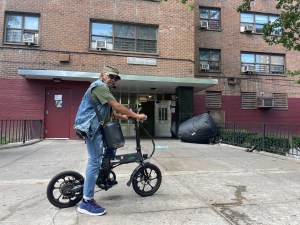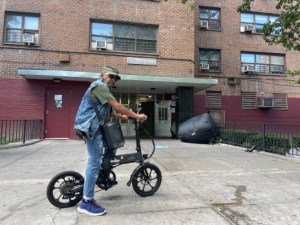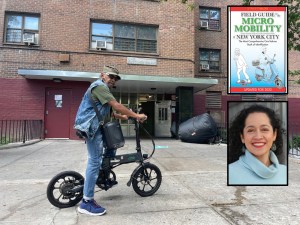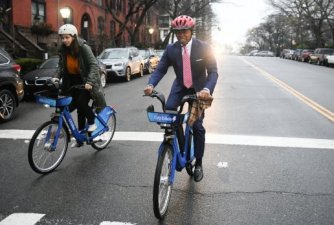EXCLUSIVE: NYCHA Backs Down From Banning E-Bikes on its Property
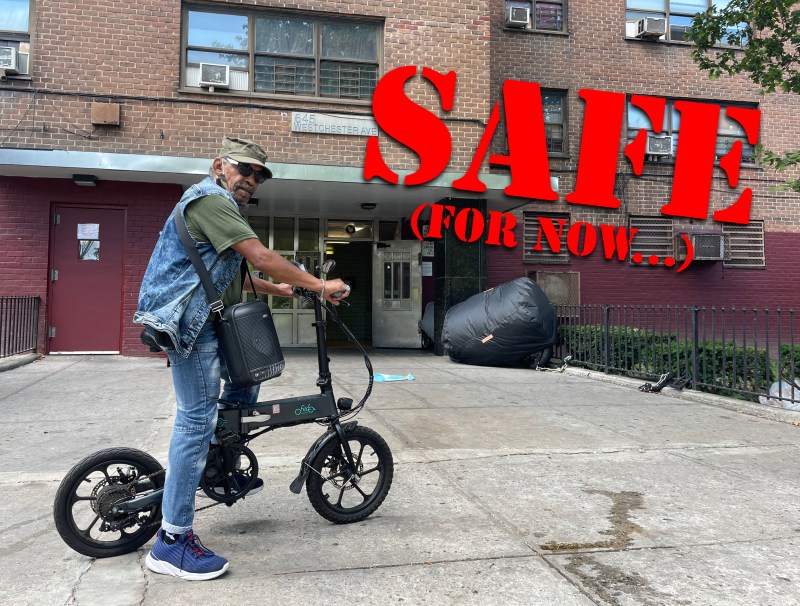
This controversy has been extinguished.
The city is backing down from a contentious policy proposal that sought to bar e-bikes anywhere on New York City Housing Authority property, a move officials said was necessary after a spate of deadly infernos attributed to faulty lithium-ion batteries, but one that was nonetheless blasted by delivery workers and their advocates who claimed residents would have to choose between a job and a roof over their head.
Sunset Park Council Member Alexa Aviles, whose district has a high population of delivery workers, told Streetsblog this week that after extensive feedback, proposed alternatives to an outright ban, and even a demo explaining the necessity of e-bikes and the batteries that power them, the agency will not move forward with its proposed blanket ban in and around its nearly 500,000 residents.
“I think they heard all of those pleas and they decided that they certainly needed more time to really think about life on the campuses and learn more just even about e-bikes,” Aviles said. “So to their credit they decided they would not move forward with a rule change. They absolutely needed to learn more. What does real robust [charging] infrastructure look like on NYCHA campuses?”
The Housing Authority had quietly proposed the rule change in June, giving residents only weeks to comment. The agency then extended the comment period until September after backlash, and is now backing down entirely, telling Streetsblog in a statement that it is looking to come up with better, safer solutions.
“There is no new rule in place and therefore, no date for implementation,” said NYCHA spokesperson Rochel Leah Goldblatt. “We are continuing our technical research and meeting with experts and stakeholders to determine the best course of action moving forward. The safety of our residents is our priority, and we are working with our partners in the city to provide safe homes to our residents.”
Aviles still acknowledged the danger of lithium-ion batteries, especially those that are cheaply made or sold second-hand, but said that prohibiting e-bikes entirely would not have stopped people from using them, and would have punished the workers whose livelihoods depend on them.
“Obviously the safety concerns are serious, NYCHA has experienced deaths because of the lithium-ion batteries. But they realize there is a lot to learn and they really need to think about their infrastructure,” she said.
Instead, Aviles and several of her colleagues, including Council members Gale Brewer of Manhattan and Oswald Feliz of the Bronx offered other recommendations, like issuing rules on the storage and safety of batteries, rather than all electric bicycles, hosting special disposal events for e-waste products like batteries, and barring the sale of batteries that are not so-called certified batteries, meaning they comply with nationally recognized safety standards, like Underwriters Laboratories (UL). Aviles’s office clarified after initial publication of this story that she is not fully in support of the UL-certification proposal because UL doesn’t certify many of the batteries that workers use.
And delivery workers say NYCHA made the right decision — especially in light of the announcement earlier this month that Sen. Chuck Schumer and the city are teaming up with Los Deliveristas Unidos, a collective of app-based delivery workers, to create new charging stations out of retrofitted newsstands.
“This is the right thing, we have to create solutions … we have to adapt to the future,” said Gustavo Ajche, a delivery worker and union leader.
The Council’s Committee on Fire and Emergency Management will hold an oversight hearing on Oct. 28 on e-bikes and lithium-ion battery fire safety.
